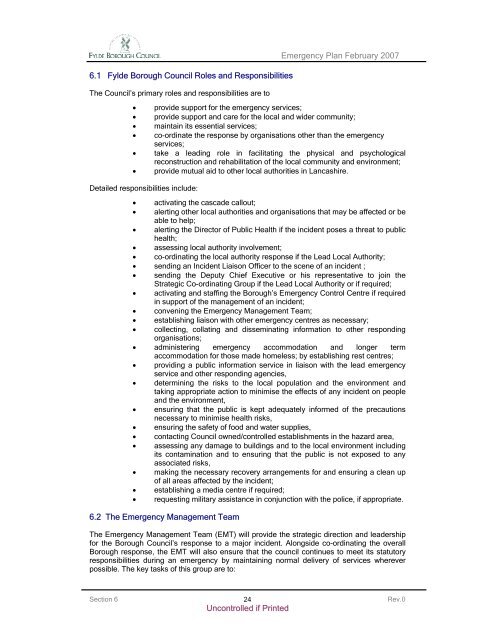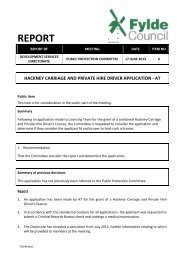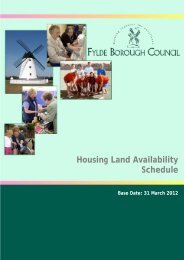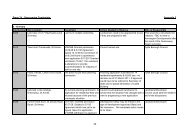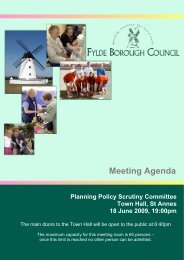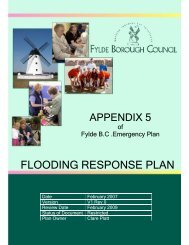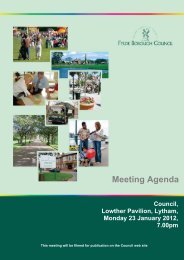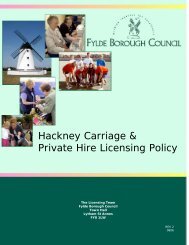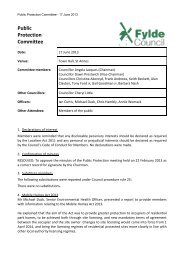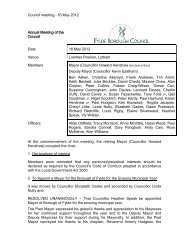Emergency Plan - Fylde Borough Council
Emergency Plan - Fylde Borough Council
Emergency Plan - Fylde Borough Council
You also want an ePaper? Increase the reach of your titles
YUMPU automatically turns print PDFs into web optimized ePapers that Google loves.
6.1 <strong>Fylde</strong> <strong>Borough</strong> <strong>Council</strong> Roles and Responsibilities<br />
The <strong>Council</strong>’s primary roles and responsibilities are to<br />
<strong>Emergency</strong> <strong>Plan</strong> February 2007<br />
• provide support for the emergency services;<br />
• provide support and care for the local and wider community;<br />
• maintain its essential services;<br />
• co-ordinate the response by organisations other than the emergency<br />
services;<br />
• take a leading role in facilitating the physical and psychological<br />
reconstruction and rehabilitation of the local community and environment;<br />
• provide mutual aid to other local authorities in Lancashire.<br />
Detailed responsibilities include:<br />
• activating the cascade callout;<br />
• alerting other local authorities and organisations that may be affected or be<br />
able to help;<br />
• alerting the Director of Public Health if the incident poses a threat to public<br />
health;<br />
• assessing local authority involvement;<br />
• co-ordinating the local authority response if the Lead Local Authority;<br />
• sending an Incident Liaison Officer to the scene of an incident ;<br />
• sending the Deputy Chief Executive or his representative to join the<br />
Strategic Co-ordinating Group if the Lead Local Authority or if required;<br />
• activating and staffing the <strong>Borough</strong>’s <strong>Emergency</strong> Control Centre if required<br />
in support of the management of an incident;<br />
• convening the <strong>Emergency</strong> Management Team;<br />
• establishing liaison with other emergency centres as necessary;<br />
• collecting, collating and disseminating information to other responding<br />
organisations;<br />
• administering emergency accommodation and longer term<br />
accommodation for those made homeless; by establishing rest centres;<br />
• providing a public information service in liaison with the lead emergency<br />
service and other responding agencies,<br />
• determining the risks to the local population and the environment and<br />
taking appropriate action to minimise the effects of any incident on people<br />
and the environment,<br />
• ensuring that the public is kept adequately informed of the precautions<br />
necessary to minimise health risks,<br />
• ensuring the safety of food and water supplies,<br />
• contacting <strong>Council</strong> owned/controlled establishments in the hazard area,<br />
• assessing any damage to buildings and to the local environment including<br />
its contamination and to ensuring that the public is not exposed to any<br />
associated risks,<br />
• making the necessary recovery arrangements for and ensuring a clean up<br />
of all areas affected by the incident;<br />
• establishing a media centre if required;<br />
• requesting military assistance in conjunction with the police, if appropriate.<br />
6.2 The <strong>Emergency</strong> Management Team<br />
The <strong>Emergency</strong> Management Team (EMT) will provide the strategic direction and leadership<br />
for the <strong>Borough</strong> <strong>Council</strong>’s response to a major incident. Alongside co-ordinating the overall<br />
<strong>Borough</strong> response, the EMT will also ensure that the council continues to meet its statutory<br />
responsibilities during an emergency by maintaining normal delivery of services wherever<br />
possible. The key tasks of this group are to:<br />
Section 6<br />
24<br />
Uncontrolled if Printed<br />
Rev.0


